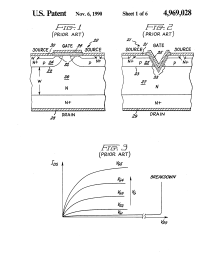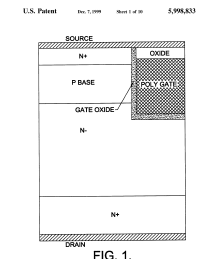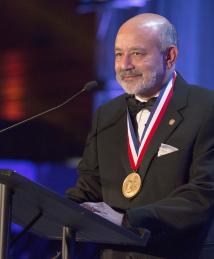Bantval Jayant Baliga
"When I came to the United States, I came as a young man of 20 years of age with this dream that I would create a technology that would have a benefit to humanity. I feel my dream has been fulfilled way beyond my wildest expectations."
B. Jayant Baliga invented the insulated gate bipolar transistor (IGBT), a semiconductor power switch that has reduced gasoline consumption by 10% and improved electrical energy efficiency by more than 40%. A tiny chip that controls energy usage, the IGBT is used in household appliances, vehicles, solar panels, fluorescent lighting, medical equipment, bullet trains and more.
Born in 1948, Baliga grew up outside Bangalore, India. His father was a well-known electrical engineer. “My father was a very big inspiration,” Baliga shared in an interview with the National Inventors Hall of Fame®. “But I wanted to get out of his shadow and make my own mark in the world.”
After earning his bachelor’s degree in electrical engineering from the Indian Institute of Technology-Madras in 1969, Baliga moved to the United States. At Rensselaer Polytechnic Institute, he continued to study electrical engineering, earning his master’s degree in 1971 and his doctorate in 1974.
“When I came to the United States, I came as a young man of 20 years of age with this dream that I would create a technology that would have a benefit to humanity,” said Baliga. “I feel my dream has been fulfilled way beyond my wildest expectations.”
In 1974, Baliga joined General Electric’s Research and Development Center, where he and his colleagues were challenged by one of the company’s vice presidents to create a new technology that would be “better than all the existing technology they were using at the time,” Baliga explained. “Within a month of his request, I put together the patent disclosure on creating the IGBT.”
Baliga had created a new high-voltage transistor that used a metal oxide semiconductor gate region to control a bipolar current within a single device for the first time. The three-terminal power semiconductor device combined high efficiency with fast switching. This device, which is now manufactured worldwide as the IGBT, controls the flow of power from an electrical energy source to any application that needs energy. Because it offers outstanding efficiency, the IGBT is widely used in transportation, lighting, medicine, defense and renewable energy generation systems.
Since its invention, the IGBT has reduced environmental pollution and saved consumers $36.5 trillion by lowering gasoline consumption by over 1.79 trillion gallons and electricity usage by over 133,000 terawatt-hours. It also has helped form the basis for the smart grid. In addition to its use in products from light bulbs to cars, the IGBT is also a critical component in enabling medical devices such as compact cardiac defibrillators, helping to save patients’ lives.
Describing the IGBT’s energy-saving impact, Baliga said, “It adds up to over 180 trillion pounds of carbon dioxide over the last 30 years. That is as much carbon dioxide as human activity generates in three years.”
Baliga holds more than 120 U.S. patents, many of them commercialized via four successful startup companies he founded in North Carolina. Among these, the GDMOSFET transistor is being manufactured worldwide for low-voltage applications in computers, data centers and automotive electronics. His awards include the 2011 National Medal of Technology and the 2014 IEEE Medal of Honor. Baliga currently serves as a Distinguished University Professor of electrical engineering at North Carolina State University.
Because his work has made such a significant impact on energy consumption, it has been suggested that Baliga has the smallest carbon footprint of anyone in the world. However, Baliga has a different perspective. “Many people can claim having a zero carbon footprint. I believe that it’s more accurate to say that I have the largest negative carbon footprint in the world.” This impact will grow exponentially because the IGBT is an essential component for deployment of electric vehicles and all renewable energy generation in the future to combat climate change.






